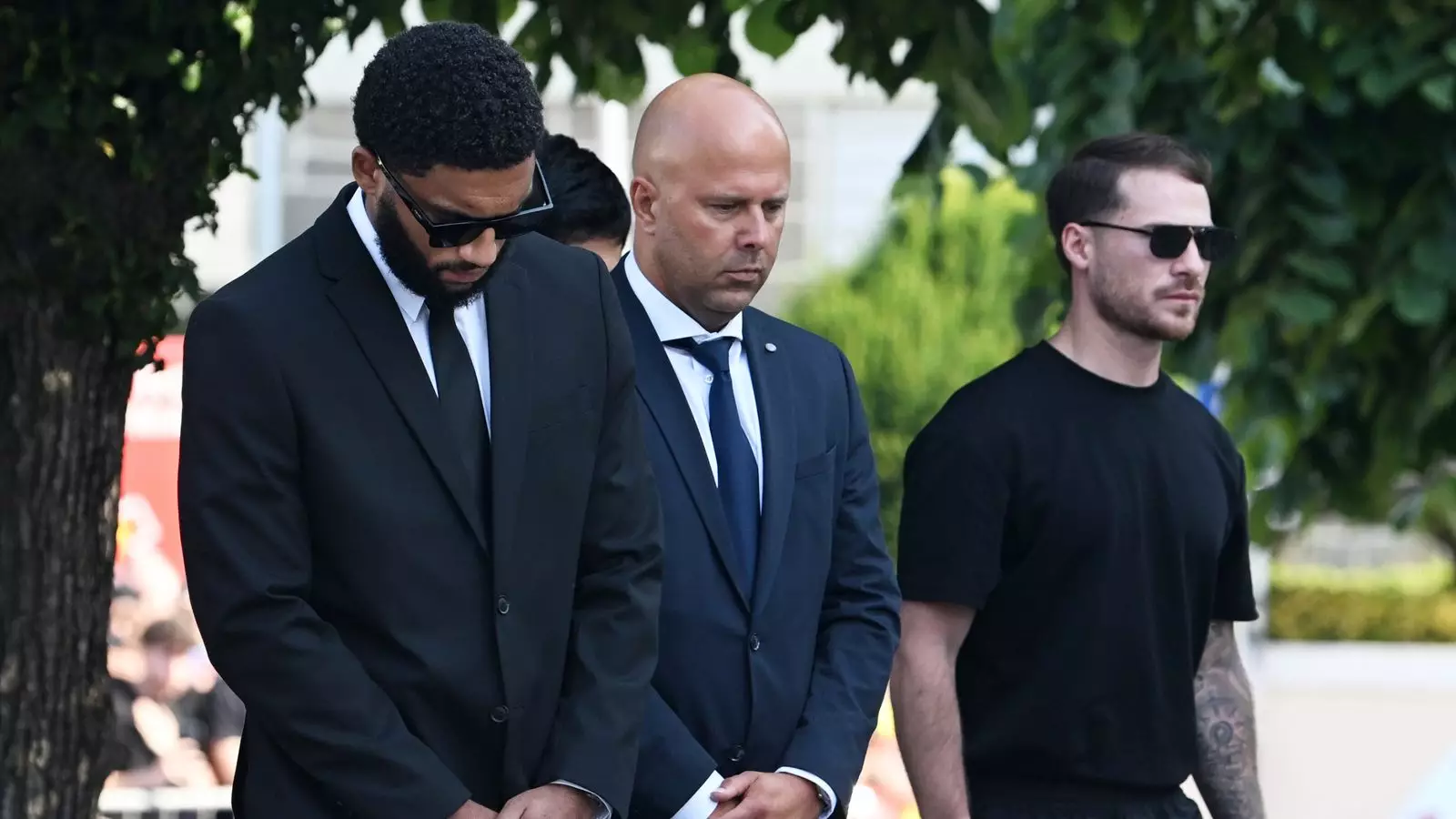In a poignant display of solidarity, the global football community and the wider society witnessed a somber moment that exposed the raw vulnerability behind the celebrated sport. The funeral of Diogo Jota and his brother, André Silva, was more than a mere official ceremony; it was an emotional testament to the profound bonds that extend beyond the pitch. The families, friends, teammates, and fans gathered in Portugal’s Igreja Matriz de Gondomar, showing that in the face of tragedy, unity and empathy remain our most vital human traits. The stark reality that even athletes, often perceived as superhumans, are susceptible to such devastating loss reminds us of the fragile nature of life—a truth that cannot be ignored.
The scene outside the church was both a tribute and an outpouring of communal grief. Supporters and celebrities alike paid their respects, some clapping in silent tribute as coffins were transported into the sacred space. The weathered expressions of mourners contrasted sharply with the vibrant athletic careers Jota and Andre Silva had built. This funeral, captured in haunting photographs, underscores an uncomfortable truth: no matter the fame or achievements, life’s unpredictability can cut short the brightest of lights just as suddenly as it illuminates them.
Football’s Humanity: From Stardom to Shared Pain
High-profile figures from the football world, including Liverpool legends and Portuguese internationals, filled the pews, reflecting a sport that often seems disconnected from the everyday struggles of ordinary life. Yet, in moments of tragedy, the sport reveals that beneath the surface, players are human beings with family ties, personal hopes, and fears. The presence of icons like Virgil van Dijk and Jordan Henderson exemplifies how football clubs become extended families, offering comfort and solace in times of despair.
What stands out most is not the grandeur of the attendees but their genuine expressions of mourning. Van Dijk’s wreath, adorned with Jota’s number, and Robertson’s tribute to Silva symbolize more than respect; they are tangible gestures that forge emotional bonds across the football community. This collective act of remembrance serves as a reminder that success on the field does not shield players from personal tragedy. It also challenges the notion that athletes are indifferent to suffering, exposing the depth of their humanity and capacity for empathy.
The Unbearable Reality of Tragedy and Society’s Response
The tragic death of the brothers was caused by a catastrophic car accident—a stark reminder of life’s unpredictable and fragile nature. The details surrounding the incident, involving a Lamborghini fire following a suspected tyre blowout, evoke feelings of helplessness and grief. This event prompts reflection on broader societal issues such as road safety, the assumptions we make about wealth and privilege, and the randomness with which tragedy can strike anyone.
In response, the community’s gesture of grief extended beyond words. Sports clubs, including Liverpool, paused their activities, flags were lowered to half-mast, and public spaces were filled with flowers. Such acts, although culturally significant, also serve as societal affirmations of shared vulnerability. They emphasize that amid political debates and societal divisions, we are fundamentally united by common human experiences—loss, mourning, and the desire for remembrance.
Looking Beyond the Surface: A Call for Genuine Compassion
The collective mourning surrounding Jota and André Silva’s deaths exposes a critical need for society to prioritize genuine compassion over superficial displays of solidarity. The football community’s tribute, including heartfelt Instagram messages from players and public figures, demonstrates how shared grief can foster empathy. Yet, it also raises questions about how society addresses the underlying issues that lead to such tragedies, such as road safety, mental health, and family support systems.
In a world often driven by individual success and material pursuits, the significance of communal mourning lies in its reminder that we are all interconnected. The outpouring of grief signifies a hope that society can do more than offer empty gestures—should we not advocate more for tangible improvements to prevent such losses in the future? The bonds formed in moments of tragedy have the potential to become catalysts for meaningful change if we choose to channel collective pain into action.
The story of Jota and Silva”s funeral ultimately challenges us to reassess our values, our priorities, and our capacity for empathy. It serves as a mirror reflecting how fleeting our earthly journeys are and how vital it is to nurture compassion before tragedy strikes again. The football world’s response, though heartfelt, must inspire a broader societal commitment to protecting life and fostering genuine care—values that endure far beyond the final whistle.

Leave a Reply